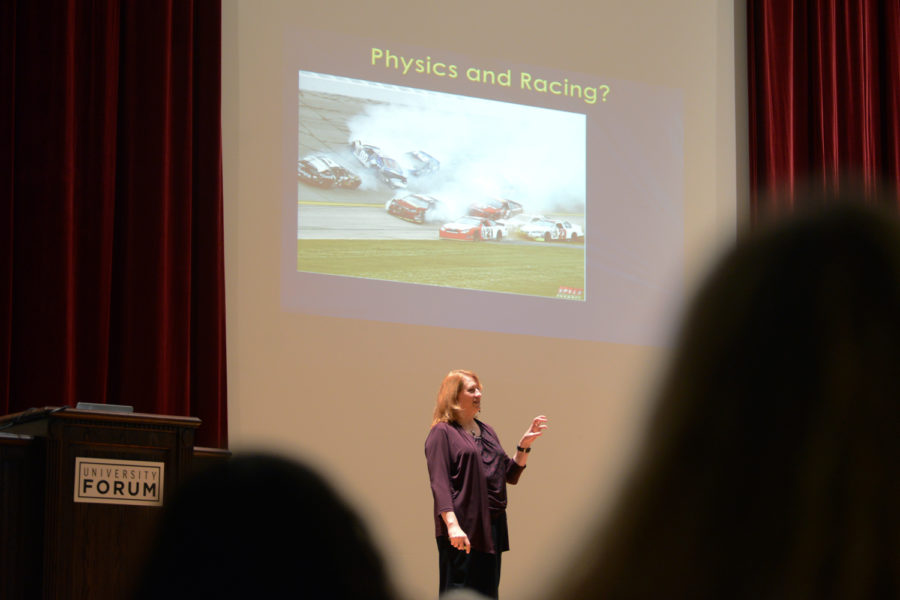Accomplished physicist and author Diandra Leslie-Pelecky finessed the audience at this semester’s second University Forum hosted by the Honors College, “The Physics of NASCAR,” Tuesday at 6 p.m. in Bennett Auditorium. Leslie-Pelecky is a nanomaterial researcher and educator who visited The University of Southern Mississippi to discuss the physics behind the nation’s most esteemed motorsport, National Association for Stock Car Auto Racing (NASCAR).
“Some of this is going to be about politics, some about literature and some about science,” said Andrew Haley, University Forum director. “We have an amazing internationally renowned polymer science program here and much of what (Leslie- Pelecky) was talking about had to do with polymers.”
Being America’s top spectator sport with 75 million fans, NASCAR is able to design and manufacture an astoundingly high-speed car that must maintain precision on the track at the same time as keeping its driver safe. In her presentation, Leslie- Pelecky explained, in simplistic and comprehensible terms, the science behind the complex manufacturing of such cars.
“I want students to understand that science is in everything they do,” Leslie-Pelecky said. “When you come off the expressway and you’re going into a turn and have to slow down—that’s physics. You cannot escape science.”
One could say Leslie-Pelecky is a NASCAR guru, considering her extensive interaction with NASCAR drivers, race shops, crew chiefs, engine builders and pit crews. Leslie-Pelecky earned two undergraduate degrees, one in physics and another in philosophy from the University of North Texas. She earned a Ph.D. in condensed matter physics from Michigan State University. She authored the book “The Physics of NASCAR” and is the co-editor of the book “Biomedical Application of Nanotechnology.”
As heavily involved as Leslie- Pelecky is, she still finds ways to progress toward productivity and greatness for all.
“I want people to think for themselves,” Leslie-Pelecky said.“If you look at all the major problems that our country is facing right now, every one of them is going to need science to solve–energy, the environment, escalating healthcare costs–those are all things that need science. If the citizenry in general doesn’t understand science, how will they make the right decisions?”
Leslie-Pelecky is a former professor in the Department of Physics at the University of Nebraska-Lincoln, where she spent most of her academic career. She served as a prominent researcher in the field of nanomedicine. Her research focused on magnetic nanoparticles–small spheres with diameters a fraction of the width of a human hair. In addition to fundamental studies of magnetism in these materials, she developed nanoparticles for medical diagnoses and treatment processes including drug delivery, magnetic resonance imaging and chemotherapy.
Her research has been supported by the National Science Foundation, the National Institutes of Health, the Department of Energy, the Office of Naval Research and other federal and state funding agencies. She has written over 60 peer-reviewed scientific papers. She is currently working on two television pilots, one about racing and one about robotics.
“Everything I write has something to do with science, and I want to picque people’s interest and get them thinking,” Leslie-Pelecky said. “I want them to go after they see something I’ve done and I want them to talk about it more.”
Leslie-Pelecky has been involved with science education for K-12 schools, future science teachers and the public since graduate school. She helped found the Michigan State Science Theatre project. Her education and outreach endeavors have been supported mainly by the National Science Foundation.
Leslie-Pelecky blogs about the science of auto racing at Building Speed. She appears every other Friday on the SiriusXM “Speedway” satellite radio program (NASCAR Channel 90) to comment on current tech-related events. She has served as a guest, contributor and writer for motorsports programming on ESPN, H2 and VOOM HD, as well as the National Science Foundation’s Science of Speed web series.
“This is one way to showcase the kind of research that is being done at the university in a fun way,butitalsoisawaytoget students involved in a more accessible way of talking about science,” she said.
The next University Forum, “The Gay Rights Revolution,” will feature lead attorney in the landmark U.S. v. Windsor Supreme Court case, Roberta Kaplan, on Nov. 10 at 6:30 p.m. in the Thad Cochran Center Ballrooms.
























